|
|
|
Sort Order |
|
|
|
Items / Page
|
|
|
|
|
|
|
| Srl | Item |
| 1 |
ID:
143798
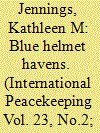

|
|
|
|
|
| Summary/Abstract |
It is commonly argued that international peace interventions will work better and more empathetically if the prevailing separation between international interveners and local people is lessened. However, I argue that, outside the microeconomic interactions and transactional relationships that comprise the peacekeeping economy, peacekeeping is characterized by bypassing – intentional circumvention – or simple exclusion of the local. Drawing on fieldwork in Liberia and the Democratic Republic of the Congo, I argue that the rules and regulations, norms and architecture of UN peacekeeping all favour and are actively disposed to bypass or exclude. Accordingly, insofar as lessening the separation between internationals and locals is necessary to enable more effective and, ideally, empathetic peacekeeping, what is needed is systemic change that runs counter to the – mostly deliberate – policies that have been enacted to effectuate and retain this very separation over the past decade or more. The likelihood of such change is small.
|
|
|
|
|
|
|
|
|
|
|
|
|
|
|
|
| 2 |
ID:
165432


|
|
|
|
|
| Summary/Abstract |
How do peacekeepers operating in Haiti, Liberia, and the Democratic Republic of the Congo (DRC) discursively construct the local people, especially local women, and to what effect? I show a connection between peacekeepers’ representations of local people, articulated in discourse, and the gendered, often sexualized interactions and transactions in peacekeeping sites. Gender plays a central role in peacekeeper discourse. It situates the peacekeeper outside, and superior to, the chaotic, dysfunctional, feminized local. At the same time, a close reading of peacekeepers’ representations of local people disrupts idealized notions of peacekeeper masculinity as protective and benign, which still persist in peacekeeping circles, revealing it as something more vulnerable and brittle. The connection between discourse and (non)performance of peacekeeping duties is neither causal nor straightforward, but I argue that peacekeepers’ discursive constructions of locals affect how peacekeepers interpret their mandate to protect civilians: protection becomes conditional on peacekeepers’ perceptions of locals’ appearance, affect, behavior, and their ability to act out an idealized role as someone “worth” protecting. The article thus brings new insight to our understandings of gender, masculinities, and protection failures in peacekeeping.
|
|
|
|
|
|
|
|
|
|
|
|
|
|
|
|
| 3 |
ID:
134145
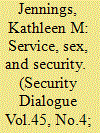

|
|
|
|
|
| Publication |
2014.
|
| Summary/Abstract |
This article uses the concept of the peacekeeping economy to examine how peacekeepers - as individuals - and peacekeeping - as a complex of institutions, policy and practice - interact with, and inevitably shape, the societies in which they operate. It focuses on how peacekeeping economies are gendered, and the implications of this gendering. The article first examines three types of work characteristic of the peacekeeping economies in Liberia and the Democratic Republic of the Congo - namely domestic service, sex work, and private security. The United Nation's (UN's) institutional responses to these sectors demonstrates the persistence of 'traditional' gendered ideologies in peacekeeping, in which the 'private', feminized sphere of the home - encompassing peacekeepers' domestic and sexual arrangements - is marginalized, while the masculinized realm of security is prioritized and closely regulated. Furthermore, factoring in peacekeepers' individual responses to service, sex, and security reveals a counter-narrative of the peacekeeper-as-vulnerable. This counter-narrative helps obscure the potential for exploitation of locals by peacekeepers. Yet it also upsets the subject position of both the peacekeeper and 'the local' in an unexpected manner, ultimately undermining the notion of the (masculine) UN protector. Such an understanding complicates popular notions of how gender 'works' in peacekeeping sites, and enables insights into the ramifications of peacekeeping's (often) self-imposed limitations
|
|
|
|
|
|
|
|
|
|
|
|
|
|
|
|
| 4 |
ID:
076736
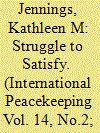

|
|
|
|
|
| Publication |
2007.
|
| Summary/Abstract |
This article calls for a re-examination of the justification, formulation and implementation of DDR programming in certain post-conflict environments. Qualitative fieldwork among ex-combatants in Monrovia, Liberia, suggests that the extent and form of DDR programming must be more sensitive to and predicated on context, accounting for conflict histories and current socioeconomic conditions and local institutional capacity. Moreover, in some post-conflict societies, a better use of international community resources may be to delink disarmament and demobilization from reintegration, focusing reintegration resources instead on open-access jobs programmes with discrete, complementary bilateral or multilateral programmes for particularly vulnerable groups.
|
|
|
|
|
|
|
|
|
|
|
|
|
|
|
|
| 5 |
ID:
083825
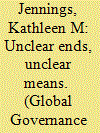

|
|
|
| 6 |
ID:
095239
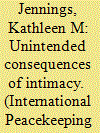

|
|
|
|
|
| Publication |
2010.
|
| Summary/Abstract |
This article assess whether peacekeeping economies are disposed to become sex tourism economies. It argues that, like sex tourism economies, peacekeeping economies are to a greater or lesser degree dependent on the exploitation of women's and girls' sexual labour. The article examines some of the gendered roles and relations that are established or reinforced by peacekeeping economies, and whether these will likely continue beyond the life of the peacekeeping operation. It argues that the similarities between peacekeeping and sex tourism economies are indicative of a possible link between foreign military presence and sex tourism, but also that the UN's position as a political, humanitarian and development actor gives it a special responsibility to prevent this happening.
|
|
|
|
|
|
|
|
|
|
|
|
|
|
|
|
|
|
|
|
|